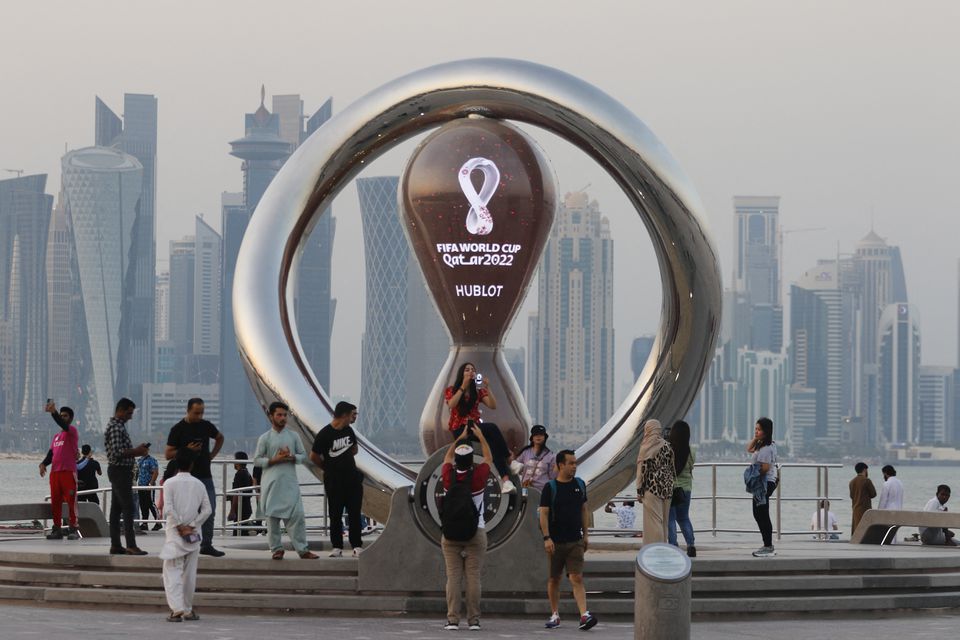
The Supreme Court’s order to television channels not to charge their subscribers extra to watch the football World Cup has put them in a dilemma as advertising revenues do not cover the rights fees, they say.
The 2022 FIFA Qatar World Cup gets underway on November 20 with hosts Qatar taking on Ecuador. Billions watch the live coverage of the four-yearly extravaganza on television, making it the most watched sporting event in the world.
Media Hub, which has obtained exclusive broadcast rights to the FIFA World Cup, has decided to charge Rs500 extra from customers stating that domestic advertisements do not cover their costs.
The matches will be shown live on Himalayan TV, and it has announced that viewers will have to pay extra to access the World Cup.
On Tuesday, a single bench of Justice Prakashman Singh Raut issued the interim order, and the final verdict is due on November 16, four days before the kick-off.
Advocates Kishor Poudel and Anupam Bhattarai had filed a writ petition stating that Nepalis didn’t have to pay extra to watch previous World Cups, and demanding additional fees this time was unlawful.
“All preparation work has come to a stop after the court order,” said Siddhartha Dhital, marketing director at Media Hub.
“If we wait for the court’s final verdict—which may or may not be in our favour—we will not have enough time to complete preparations. There is a lot of technical stuff, and we don't know what to do.”
Dhital says it is not possible to broadcast without charging customers. “If the court’s decision stays, we might not be able to broadcast the matches.”
He said that Media Hub had already paid $1.5 million to Viacom 18 India, including taxes to the Nepal government, to broadcast the games. The tournament final is scheduled to be held on December 18.
Dhital estimates their total expenses to broadcast the World Cup will come to Rs400 million. “Revenues from domestic commercials are not sufficient to cover the cost. So we have to make up for the shortfall by charging the customers.”
International media reports say that the Qatar World Cup will be the most expensive ever. The total cost of hosting the tournament is reported to be around $220 billion, around 20 times higher than the cost of the previous World Cup in Russia.

"Customers of Net TV and Via TV have started making payments to watch the live broadcasts," Dhital said.
“The issue has been misunderstood. It is not mandatory to pay extra fees. Viewers who do not wish to pay more can watch other channels but not the World Cup matches,” he said.
For the first time in history, a Middle Eastern country is hosting the World Cup football. A total of 64 matches will be played during the month-long competition.
According to lawyers the Post talked to, there should not be a monopoly in the market.
“As Media Hub has obtained exclusive rights to broadcast the FIFA World Cup, it is not fair to charge extra,” they said. “It is essential to see whether the exclusive rights secured by the companies impact the market. Monopoly should not prevail in the market.”
Consumer rights activists say it is unfair to charge customers extra to watch the World Cup as they have paid their service providers the regular charges.
Prem Lal Maharjan, president of the National Consumer Forum, said that nobody can charge extra against the interest of customers.
“It’s against the law. It is like cheating customers. They cannot charge more in order to recover their investment,” Maharjan said.
"Subscribers have been watching the television programmes by making advance payment. They need not pay more.”
Football fans around the world have criticised the high prices of the tickets to the World Cup matches.
Fan groups across Europe have accused FIFA of "hammering" supporters by hiking ticket prices in the "most expensive World Cup" ever.
The most expensive tickets on general sale for the December 18 final at Lusail Stadium cost 5,850 Qatari riyals (£1,179), which is 46 percent higher than the £807 ticket price for the 2018 final won by France.












